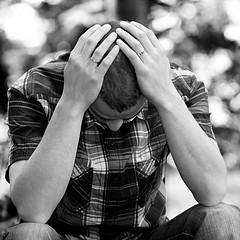Men’s Health: Eating Disorders In Men Could Be Connected To Gender Tropes
 Eating disorders are generally considered something that only women deal with. But with Men’s Health Month just starting, it is important to shed light on the fact that men can suffer from these disorders as well.
Eating disorders are generally considered something that only women deal with. But with Men’s Health Month just starting, it is important to shed light on the fact that men can suffer from these disorders as well.
Eating Disorders in Men
According to the National Association of Anorexia Nervosa and Associated Disorders (ANAD), there are some subtle differences in how eating disorders appear in men. The ANAD states that men who suffer from eating disorders try to make themselves either smaller or as muscular as possible.
A new study from the University of Sydney investigated what caused men to turn to anorexia or bulimia rather than the disordered eating and over-exercising behaviors that are found in people with muscle dysmorphia. One hypothesis is that eating disorders could be related to gender roles.
Gender Tropes and Eating Disorders
This suggests that men who suffer from anorexia could be more likely to accept “feminine” gender tropes such as sexual fidelity, modesty, domesticity and investment in appearance, whereas muscle dysmorphia sufferers could be more likely to favor “masculine” gender tropes like risk-taking, winning, self-reliance and emotional control.
Stuart B. Murray, Elizabeth Rieger, Lisa Karlov and Stephen Touyz, clinical psychologists of the University of Sydney, worked with 24 male anorexia nervosa patients, 21 male muscle dysmorphia patients and a control group of 30 gym-attending men.
The study found that those who suffered from muscle dysmorphia reported “significantly greater adherence” to “masculine” gender roles when compared with anorexia sufferers and the control group. On the other hand, anorexia sufferers reported greater attachment to “feminine” gender roles than the muscle dysmorphia or control groups.
More Accurate Treatments for Men
Murray clarified in a press release that the results are not an indication “that the men with anorexia were any less masculine, nor that the men with muscle dysmorphia were less feminine than the control subjects recruited. It is however an indication of the increasing pressures men are under to define their masculinity in the modern world.”
Murray’s colleague, Touyz, also stated in the press release that these findings about gender role adherence will be crucial in future studies and “to develop better treatment programs for men with eating disorders.”
Source: The Huffington Post
 Eating Disorder Self Test. Take the EAT-26 self test to see if you might have eating disorder symptoms that might require professional evaluation. All answers are confidential.
Eating Disorder Self Test. Take the EAT-26 self test to see if you might have eating disorder symptoms that might require professional evaluation. All answers are confidential.